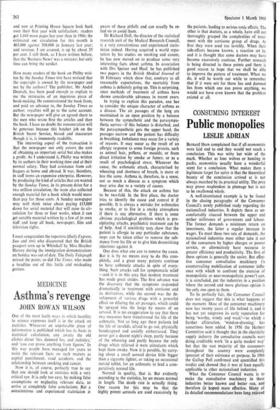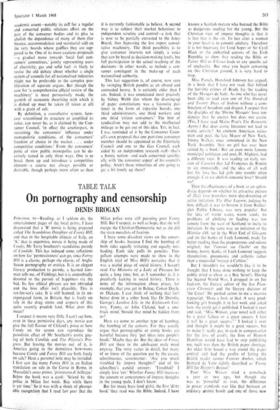Public monopolies
CONSUMING INTEREST LESLIE ADRIAN
Bernard Shaw complained that if all economists were laid end to end they would not reach a conclusion. This was witty but wide of the mark. Whether as lone wolves or hunting in packs, economists usually have a wonderful scent for a conclusion. What makes them a legitimate target for satire is that the theoretical beauty of the conclusion arrived at is not always matched by its practical utility. The prey may prove resplendent in plumage but is not to be swallowed whole.
A well-intentioned example is to be found in the closing paragraphs of the Consumer Council's newly published study regarding the nationalised industries. It depicts these as un- comfortably situated between the upper and nether millstones of government and labour. The former demands a minimum return on investment, the latter a regular increase in wages. To meet these two sets of demands, the nationalised industries must either take it out of the consumers by higher charges or poorer service, or alternatively have recourse to greater efficiency and productivity. The first of these options is generally the easier. But effec- tive consumer consultative machinery ea countervailing mobilisation of consumer influ- ence with which to confront the exercise of monopolistic or near-monopolistic power') can, it is concluded, put the industries in a position where the second and more glorious option is the only one open to them.
To be perfectly fair, the Consumer Council does not suggest that this is what happens at the moment. Most of the consumer machinery now has twenty years of life behind it, and it has not yet outgrown its early reputation for being 'worthy, windy and weak'—to which a further alliteration, 'window-dressing,' has sometimes been added. In 1956 the Herbert Committee said it thought that in the electricity supply industry the consultative councils were doing creditable work 'in a quite modest way' but that the vast majority of the consumers throughout the country were completely ignorant of their existence or purpose. In 1966 the Gallup Poll confirmed and quantified this verdict and, showed that it was at least equally applicable to other nationalised industries.
What the Consumer Council wants is to make the consultative machinery in these industries better known and better run, and therefore (it hopes) more effective. Many of its detailed recommendations have long enjoyed academic assent—notably its call for a regular and concerted public relations effort on the part of the consumer bodies and its plea to abolish the dependence of many of them (for finance, accommodation and secretarial aid) on the very boards whose gadflies they are sup- posed to be. One of its more cautious proposals —a gradual move towards 'local fuel con- sumers' committees,' jointly representing users of electricity, gas and solid fuel—is likely to revive the old debate about whether a single system of councils for all nationalised industries might not be preferable to the complex pro- liferation of separate organs. But though the case for 'a comprehensive official review of the machinery' is most persuasively made, the garnish of economic theorising with which it is dished up must be taken (if taken at all) with a grain of salt.
By definition, a consultative system, how- ever streamlined its structure or amplified its voice, can never- be, as is claimed by the Con- sumer Council, 'in effect the counterpart, in sustaining the consumers' influence under monopolistic conditions, of the consumers' freedom of choice in the market . . . under competitive conditions.' From the consumers' point of view public monopolies can be de- cisively tamed in only three ways. One is to break them up and introduce /a competitive element—a course not always possible or desirable, though perhaps more often so than
it is currently fashionable to believe. A second way is to subject their market behaviour to independent scrutiny and control—a task that is now to be partially entrusted to the Jones Board, thus bypassing the less expert consul- tative machinery. The third possibility is to give consumer interests not simply a voice that can be heard at decision-making levels, but full participation in the actual reaching of the decisions—in other words, to include a con- sumer contingent in the make-up of each nationalised authority.
This last suggestion is, of course, now seen by swinging British pundits as an absurd and outmoded heresy. It is certainly older than I am. Indeed, it was enunciated most precisely by Sidney Webb (for whom the drawing-up of paper constitutions was a favourite pas- time) in the form of tripartite boards, one third administrators, one third workers and one third 'citizen consumers.' The hint of syndicalism may not add to the intellectual mileage to be got out of this idea. Yet, in fact, I was reminded of it by the Consumer Coun- cil's own proposal that one part-time consumer member should be appointed to the Electricity Council and one to the Gas Council, each aided by an independent research staff—that's a bonny notion—and each concerned specific- ally with 'the consumer aspect' of his council's policy. Aren't those minorities of one going to get a bit lonely up there?



































 Previous page
Previous page